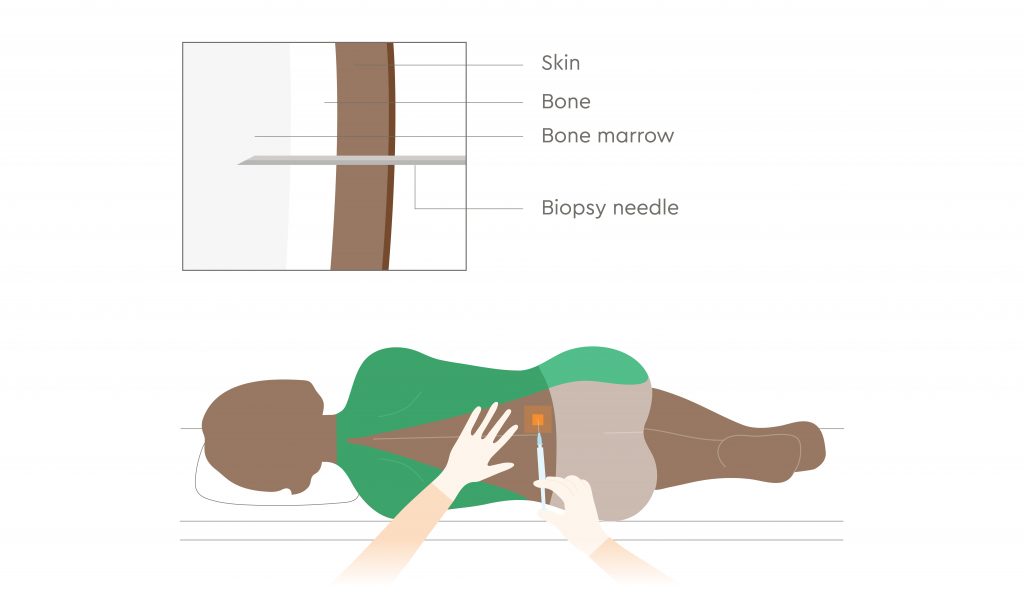- Patients
- Cancer diagnosis
- Pathology tests
- Bone marrow test

Bone marrow test
A bone marrow test is a diagnostic procedure that is used to take a small sample of bone marrow, usually from your pelvis (hip bone).
What is a bone marrow test?
A bone marrow test is a diagnostic procedure that is used to take a small sample of bone marrow, usually from your pelvis (hip bone).
There are two types of bone marrow test:
- A bone marrow aspiration – where a small amount of bone marrow fluid is withdrawn using a needle
- A bone marrow trephine biopsy – where a small core of bone marrow tissue is removed
What is a bone marrow test used to diagnose?
Bone marrow tests are usually performed to diagnose conditions that affect the bone marrow such as lymphoma, leukaemia or myeloma. You may find it worrying to hear that you need to have a bone marrow test. Our consultant haematologists are specialists in diagnosing a range of conditions affecting the bone marrow or blood and will provide you with answers as quickly as possible. Your symptoms may be caused by a condition other than cancer, but it’s important to be seen quickly so we can be sure and start any treatment you might need as soon as possible.
Book an appointment
If you’re worried about symptoms or would like a second opinion, enquire now for more information and to book an appointment. We’re recognised by all major private medical insurers and also offer a range of self-payment options.
What is bone marrow?
Bone marrow is the spongy tissue in the centre of some of your bigger bones such as the thigh bones, breastbone, pelvis and backbones. The bone marrow is where blood cells are made – it contains blood stem cells that can develop into more specialised blood cells such as white blood cells, red blood cells and platelets. These are gradually released into the bloodstream.
Why would I need a bone marrow test?
Your consultant may recommend a bone marrow test if you have symptoms of a blood or bone marrow cancer or an abnormal blood test. A bone marrow test is the best way to check for problems that may be causing these symptoms and help your consultant provide an accurate diagnosis. You may also have a bone marrow test to help plan treatments, see how well they’re working, or determine if cancer has spread from another part of your body to your bone marrow.
What happens during a bone marrow test?
Before we carry out your bone marrow tests, we’ll ask you to sign a consent form. This states that you agree to have the procedure and you understand what it involves. We want to involve you in all decisions about your care and treatment. You can always talk to a member of your care team if you’d like more information about our consent process.
Bone marrow biopsies are usually taken from your pelvis (hip bone). At the start of the bone marrow test, your consultant or nurse will ask you to lie on your side and bend your knees up towards your chest. You’ll need to keep as still as possible during the procedure.

The skin over your pelvic area will be cleaned, and a local anaesthetic will be injected to numb the region from which the sample will be taken.
When you’re ready, and the local anaesthetic has taken effect, your consultant or nurse will perform an aspiration by passing the needle into your pelvis and taking a small sample of liquid marrow. You might feel a pulling sensation which can be a little uncomfortable as the sample is drawn, but this will quickly pass.
Sometimes, a bone marrow aspiration is all that is needed. If you’re also having a trephine biopsy (where a tiny core of the bone marrow tissue is removed), a second needle will be inserted into your pelvis by your consultant or nurse. You might experience a pushing sensation or a feeling of pressure building up as this is performed, but this too will quickly pass.
Once the procedure is finished, you’ll need to stay lying down for no more than 30 minutes so we can ensure there’s no bleeding. You’ll have a dressing applied over the site of your bone marrow test and you can go straight home afterwards. You’ll need to keep your bandage on for at least 24 hours and should avoid getting it wet in that time.
There are no special preparations needed for your bone marrow test. You’ll need to let us know of any medication you’re taking, and if you’re allergic to any medication, anaesthetic or dressings.
The time it takes to perform the procedure depends on how many bone marrow samples are taken. It usually takes around 15 minutes per sample. If you’re having both a bone marrow aspiration and trephine biopsy, you can expect the whole procedure to last 30 minutes.
You may feel some pain or discomfort as the sample is taken, but this should pass very quickly. As the anaesthetic starts to wear off, you may feel a bruising or aching sensation around the site from which your sample was taken.
You can take pain relief such as paracetamol in the days after your test if you need to. You should get in touch with your GenesisCare team if you feel you need some stronger pain relief, the pain continues for more than a few days, or you have significant bleeding or bruising.
We know that waiting for a test result can be a worrying time, so we aim to get your results to you as quickly as possible. The bone marrow samples will be sent to the laboratory for analysis, and your results will be back within five to seven days. A copy of your results will be shared with your GP and we’ll contact you to arrange an appointment to discuss them with you.
Is a bone marrow test safe?
Bone marrow tests are routinely performed without any issues. Before you go ahead with the test, your consultant or nurse will explain any potential complications of the procedure and advise on managing them should they occur. You’ll also be given plenty of time to ask any questions.
Possible side effects include:
- Bleeding
- Bruising
- Pain
- Tingling sensation in your leg
There’s also a small risk of infection at the site of your bone marrow test. You must contact your nursing team straight away if you experience:
- A high temperature (above 38°C)
- Increased pain at the site of your bone marrow test
- Swelling or redness if you have white skin or darkening if you have brown or black skin, at the site of your bone marrow test
- Bleeding from the site that doesn’t resolve after applying pressure
If you think it’s an emergency, you should go straight to your nearest Emergency Department (A&E).
Read next

Doctors
Our doctors
GenesisCare works with many leading and experienced cancer doctors who share our commitment to providing excellent patient care

Centres
Our centres
With 440 centres across the world, we're continuing to diagnose and treat without delay, bringing specialist care closer to our patients in the UK, Spain, Australia and the US.

Cancer care
Exploring cancer care
We are the UK’s leading private provider of advanced radiotherapy and cancer care. We offer fast access to the latest technology and treatments that has been proven to make a difference.

Cancer care
How can we help?
Accessing world-class cancer care is easier than you think. Follow these easy steps to get treatment, tests and scans, or a second opinion at GenesisCare, and find out the different ways of funding your cancer care.

Patient support
Patient stories
We believe patients can be our teachers and trusted advisers, benefiting from their unique experiences.